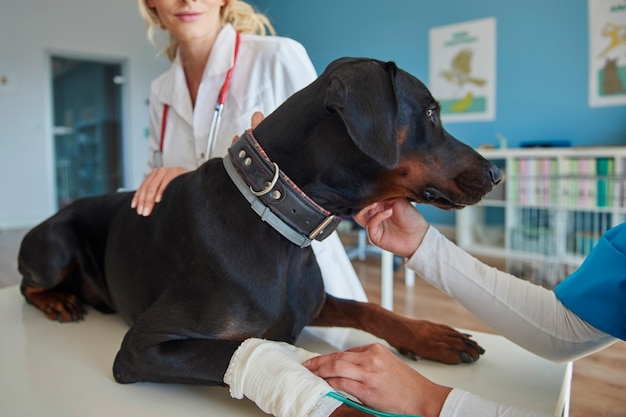How to Spot Arthritis Symptoms in Older Pets


How to Spot Arthritis Symptoms in Older Pets
As our beloved pets age, their needs often change, and so can their health. One of the most common challenges faced by senior pets is arthritis—a condition that can slowly diminish mobility and comfort if left unrecognized. At Clifton Veterinary Clinic, we understand how concerning it can be to watch your dog or cat struggle with everyday activities. That’s why our veterinary team in Clifton, TX is dedicated to helping pet owners identify arthritis symptoms in pets early. In this article, we’ll guide you through the signs of arthritis in older dogs and cats, explore the causes, discuss available treatments, and provide practical tips for senior pet care in Clifton, TX and surrounding communities.
If you have noticed changes in your pet’s movement or are searching for quality veterinary services near me, you are not alone. Early recognition and proactive management can make all the difference for your aging companion. Read on to discover how you can keep your senior pet comfortable, active, and happy for years to come.
Recognizing Arthritis Symptoms in Pets: What to Look For
Spotting arthritis symptoms in pets can be challenging, especially since our furry friends often hide discomfort well. However, attentive pet owners may notice subtle changes in behavior or movement that signal the onset of joint issues. Common signs of arthritis in older pets include stiffness when getting up or lying down, reluctance to climb stairs or jump onto furniture, limping or favoring certain limbs, and a noticeable decrease in activity or enthusiasm for walks and playtime. Additionally, you may observe your dog or cat hesitating before performing movements that were once routine, or grooming less if joint pain makes it uncomfortable to reach certain areas.
Behavioral changes such as increased irritability, restlessness, or even withdrawal from family interactions can also point to discomfort caused by arthritis. Some pets may lick or chew at painful joints, while others show signs of muscle loss in affected limbs. If you notice your senior pet struggling on chilly mornings—a common occurrence in Central Texas—or after a day of increased activity, these could be early indications that arthritis is setting in.
It’s essential to remember that arthritis symptoms in pets may develop slowly over time. Regular check-ins with a veterinarian near me provide an opportunity for early detection and intervention, giving your pet the best chance at maintaining a good quality of life as they age.
Understanding the Causes of Arthritis in Senior Pets
Arthritis, or degenerative joint disease, is most frequently seen in older pets as a natural result of aging and long-term wear and tear on the joints. Over time, the cartilage that cushions bones within the joint gradually thins and becomes less effective, leading to pain and inflammation. Larger dog breeds, overweight pets, and those with a history of joint injuries or orthopedic surgery are at increased risk for developing arthritis in their senior years.
Genetics can also play a role, with certain breeds predisposed to hip or elbow dysplasia, both of which increase the likelihood of arthritis later in life. For cats, the condition often goes unnoticed, as they tend to be more subtle in displaying pain; however, arthritis is just as prevalent in aging felines. Environmental factors such as living on slippery floors or frequently jumping from high places can add strain to joints over time, and colder weather in Clifton, TX may exacerbate joint stiffness for pets already dealing with arthritis.
Understanding these risk factors highlights the importance of ongoing senior pet care in Clifton, TX, including weight management, regular exercise, and routine veterinary exams to monitor joint health.
The Role of Advanced Diagnostics in Detecting Arthritis
At Clifton Veterinary Clinic, our veterinary professionals use a combination of thorough physical examinations, advanced imaging such as digital X-rays, and laboratory tests to assess your pet’s joint health accurately. Early diagnosis allows us to develop a tailored treatment plan that addresses your pet’s specific needs, helping to slow the progression of arthritis and improve their comfort and mobility.
Treatment and Management Options for Arthritis in Pets
Managing arthritis symptoms in pets involves a combination of professional veterinary care, lifestyle modifications, and sometimes medication or surgical intervention. After a comprehensive evaluation, our team of veterinarians will recommend an individualized plan designed to restore your pet’s quality of life.
Treatment approaches involve pain management strategies, joint supplements, physical therapy, and weight control. Non-steroidal anti-inflammatory drugs may be recommended to alleviate discomfort, while omega-3 fatty acids and glucosamine-chondroitin supplements can help protect joint cartilage. In some cases, advanced therapies such as laser therapy or targeted rehabilitation exercises are beneficial, particularly for pets who cannot tolerate certain medications.
For pets with severe arthritis or those who have not responded to conservative management, orthopedic surgery may be considered. At Clifton Veterinary Clinic, we offer advanced diagnostics and orthopedic surgery in Clifton, TX, ensuring that your pet receives the highest standard of care close to home.
Our veterinary team also educates pet owners on the importance of modifying your pet’s environment to reduce joint strain. Simple changes such as providing orthopedic beds, using ramps for easier access to favorite spots, and placing non-slip mats on tile or hardwood floors can make daily life much more comfortable for your senior companion.
Tailored Senior Pet Care in Clifton, TX
Every pet’s arthritis journey is unique, which is why our veterinarians emphasize ongoing monitoring and regular check-ups as part of senior pet care in Clifton, TX. By tracking your pet’s mobility, pain levels, and response to treatment, we can make timely adjustments to their care plan, ensuring lasting comfort and activity.
Preventing Arthritis Progression: Home Care Tips for Pet Owners
While arthritis cannot always be prevented, there are steps you can take at home to slow its progression and support your pet’s joint health. Keeping your pet at a healthy weight is one of the most effective ways to reduce stress on aging joints. Feeding a balanced diet rich in nutrients, providing regular low-impact exercise such as walking or gentle play, and maintaining consistent routines all contribute to overall well-being.
Consider incorporating joint-friendly activities like swimming or controlled leash walks, which help maintain muscle tone without placing undue strain on arthritic joints. For cats, encouraging movement with interactive toys and climbing structures designed for easy access can help keep them limber.
Environmental modifications, such as using pet stairs or ramps, providing soft bedding, and keeping food and water within easy reach, make a significant difference in your pet’s daily comfort. As the weather in Clifton, TX shifts from warm to cooler seasons, watch for increased stiffness or reluctance to move, and provide extra warmth as needed with cozy blankets or heated beds.
Remember, regular veterinary visits are a crucial component of prevention and early intervention. Our veterinary professionals are always available to answer your questions about senior pet care in Clifton, TX and to provide guidance tailored to your pet’s specific needs.
When to Seek Veterinary Care for Arthritis Symptoms
If you notice your pet showing signs of joint pain, decreased mobility, or changes in behavior, it’s important to contact your veterinarian promptly. Early intervention can significantly improve your pet’s comfort and slow the progression of arthritis. Warning signs that require professional evaluation include persistent limping, difficulty rising, reluctance to exercise, noticeable pain when touched, or sudden changes in appetite or mood.
In some cases, symptoms such as severe lameness, vocalization when moving, or sudden inability to walk may indicate an acute flare-up or additional complications that need immediate attention. Our veterinary team at Clifton Veterinary Clinic is equipped to provide comprehensive diagnostics and treatment for arthritis symptoms in pets in Clifton, TX and surrounding communities.
As with any ongoing health condition, regular follow-ups and monitoring are essential. We encourage pet owners to schedule routine check-ups, especially as their pets enter their senior years. If you are searching for a vet near me who can offer advanced arthritis care and compassionate support, our clinic is here to help your pet age comfortably and gracefully.
Compassionate Senior Pet Care in Clifton, TX: Schedule an Appointment Today
Arthritis is a common but manageable challenge for senior pets, and early recognition makes all the difference. By watching for subtle changes in your pet’s movement and behavior, seeking timely veterinary diagnostics in Clifton, TX, and following a tailored care plan, you can help your aging companion enjoy their golden years with comfort and joy.
At Clifton Veterinary Clinic, our team of veterinarians is committed to providing comprehensive arthritis management and senior pet care in Clifton, TX and surrounding communities. If you are concerned about arthritis symptoms in pets or want to learn more about our pain management and orthopedic services, we invite you to schedule an appointment with our caring veterinary professionals. Experience the difference of quality veterinary services near me and compassionate care that puts your pet’s well-being first.
Contact our veterinary team today at (254) 675-8925 or visit us in person at Clifton, TX. Together, let’s ensure your pet stays active, happy, and comfortable for years to come.
This article is intended for informational purposes only and does not replace professional veterinary care. If your pet is experiencing pain or mobility issues, please consult your veterinarian for a personalized diagnosis and treatment plan. For more information on arthritis in pets, visit reputable sources such as the American College of Veterinary Surgeons and the American Veterinary Medical Association.



















